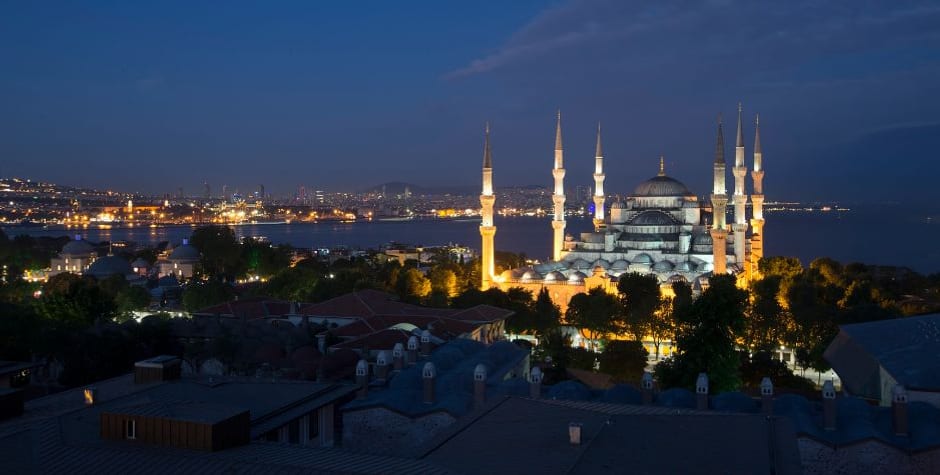

Erdogan: The Neo-Ottoman Sultan Against The Christians of Turkey
Erdogan: The Neo-Ottoman Sultan Against The Christians of Turkey
On the international stage, Turkish President Recep Tayyip Erdogan imposes his pan-Turkish imperialist vision and positions himself as the leader of the Sunni world, while Europe, infiltrated by the Muslim Brotherhood, stands by. The European Centre for Law and Justice (ECLJ) also highlights the systemic persecution of Christians in Turkey in the name of Turkish-Islamic nationalism and denounces it in its October 2024 submission of Turkey’s Universal Periodic Review to the United Nations Human Rights Council.
Abroad, Turks care less about the severe inflation in Turkey than about defending their national and religious identity. Turkish President Recep Tayyip Erdogan knows how to champion this cause, regularly criticising the 'Islamophobia' that he claims is widespread in Europe, with statements such as “Europe, home to 35 million Muslims, including 6 million Turks, is increasingly becoming an open-air prison for our brothers and sisters.” Abroad, Erdogan even defends Christians, albeit cynically, reacting before Pope Francis to express his indignation following the obscene opening ceremony of the Olympic Games in Paris.
Erdogan's neo-Ottoman dream of restoring the Empire and the Caliphate
The total number of Turkish expatriates exceeds 6.7 million, with 5.7 million of them living in Western European countries. Germany is home to 2.9 million people of Turkish origin, of whom 1.5 million hold Turkish nationality. This diaspora represents a significant voting base for Erdogan. In the Turkish presidential election of May 2023, out of the more than 700,000 votes cast in Germany, two-thirds went to the leader of the Justice and Development Party (AKP). Turks are now feeling at home everywhere: starting this school year in 2024, Turkish students no longer say 'Central Asia' but rather 'Turkistan,' meaning the 'land of the Turks.'
Erdogan continues to bring his neo-Ottoman dream of restoring the Empire and the Caliphate closer to reality, asserting himself as both a political and religious leader. In the race for leadership of the Sunni world, he supports the Muslim Brotherhood, which is considered a terrorist organisation by Saudi Arabia, Egypt, Syria, Russia, and the United Arab Emirates, but is welcomed in Europe. On October 12, 2024, in Hamburg, more than 2,000 Muslims demonstrated to advocate for the establishment of a Caliphate and the imposition of Sharia law, responding to the call of the German Islamist organisation Muslim Interaktiv, which is close to the Muslim Brotherhood. Armenia, which blocks territorial continuity between Turkey and Azerbaijan, is now facing the threat of disappearance after the ethnic cleansing of 120,000 Armenians from Nagorno-Karabakh in September 2023.
Christians in Turkey: Victims of Turkish-Islamic Nationalism
In Turkey, the strong sense of religious nationalism, coupled with the government's emphasis on Islamic values, places considerable pressure on religious minorities. Christians are viewed negatively and are often seen as carriers of Western influence. In 2023, Christians were the most persecuted religious minority, with a total of twenty-two violent attacks against them recorded. The ECLJ condemned this persecution of Christians in its October 2024 submission of Turkey’s Universal Periodic Review to the United Nations Human Rights Council.
The persecution of the Greek Orthodox Church is the most emblematic. It fluctuates depending on the state of relations between Turkey and Greece. Greek Orthodox foundations are regularly expropriated under the false pretext that they are 'disused' and must therefore be managed by the General Directorate of Foundations, which reports directly to the Turkish Ministry of Culture and Tourism. The Halki Seminary, closed in 1971, has still not been reopened. Neither the legal personality nor the ecumenical status of the Ecumenical Patriarchate of Constantinople is recognised. The ECLJ will submit its observations in the Mavrakis case, currently before the European Court of Human Rights (ECHR). This case concerns clerics whom Turkey prohibits from becoming members of the board of Greek Orthodox foundations.
Furthermore, the Turkish government uses the Penal Code to target religious clergy, falsely accusing them of working to undermine its sovereignty. This is particularly evident in southeastern Turkey, where Armenian and Syriac Christian communities are caught in the fighting between the Turkish army and Kurdish resistance groups. For instance, on January 9, 2020, the anti-terrorism branch arrested three Syriac Christians, including a priest, who were held without communication and denied access to a lawyer. Father Sefer Bileçen was accused of providing food and water to members of the Kurdistan Workers' Party (PKK), which Turkey considers a terrorist organisation. Despite his explanation that, in accordance with his Christian faith, he helps anyone in need without discrimination, he was sentenced on April 7, 2021, to two years and one month in prison.
The expulsion of foreign Christians for 'threat to national security'
Another form of persecution of Christians in Turkey is manifested by the expulsion of Christian missionaries, under the application of code N-82, on the pretext that they pose a threat to Turkey's national security. Turkish Protestants also suffer from this measure, as they find themselves deprived of trainers and teachers. According to the Association of Protestant Churches, 115 foreign Christians were banned from entering or staying in Turkey between 2019 and 2023. Including their spouses and children, who had to leave with them to avoid separating the family, the total number of Christians affected rises to 250. Additionally, nine more foreign Christians, whose expulsion was jointly validated by the Turkish Constitutional Court on June 7, 2024, while they were legally residing in Turkey, must now leave the country.
The fact that these nine cases were judged collectively rather than individually indicates that the facts and legal issues involved are very similar in each case. This suggests the establishment of a government system aimed at banning foreign religious figures from the country. These Christians can now take their case to the ECHR, just like Kenneth Wiest, an American Protestant who had been legally residing in Turkey for over thirty years and was suddenly barred from returning after a trip in June 2019. In the Wiest case, the ECLJ will also submit its observations to the ECHR. The deportation of foreign Christians also affects dozens of Iranian converts who are refugees, and who face the risk of death in their home country due to their apostasy from Islam.
Christians in Turkey, whether they are Turkish citizens or foreigners, and whether they are Catholic, Orthodox, or Evangelical Protestants, face various forms of persecution and discrimination in a climate of rising Turkish nationalism and political Islam, promoted by pro-government media and Erdogan's rhetoric. Their situation is marked by a mix of administrative restrictions, social pressure, harassment, or direct violence. Turkish converts to Christianity are particularly vulnerable, as they are seen as having 'betrayed' Turkish Muslim identity. The authorities closely monitor church activities, when they do not simply shut them down, and deprive community leaders of training. In this dramatic context, the European Centre for Law and Justice continues to support Turkish Christians and foreign Christians in Turkey, both at the United Nations bodies and the Council of Europe, as well as at the ECHR.












